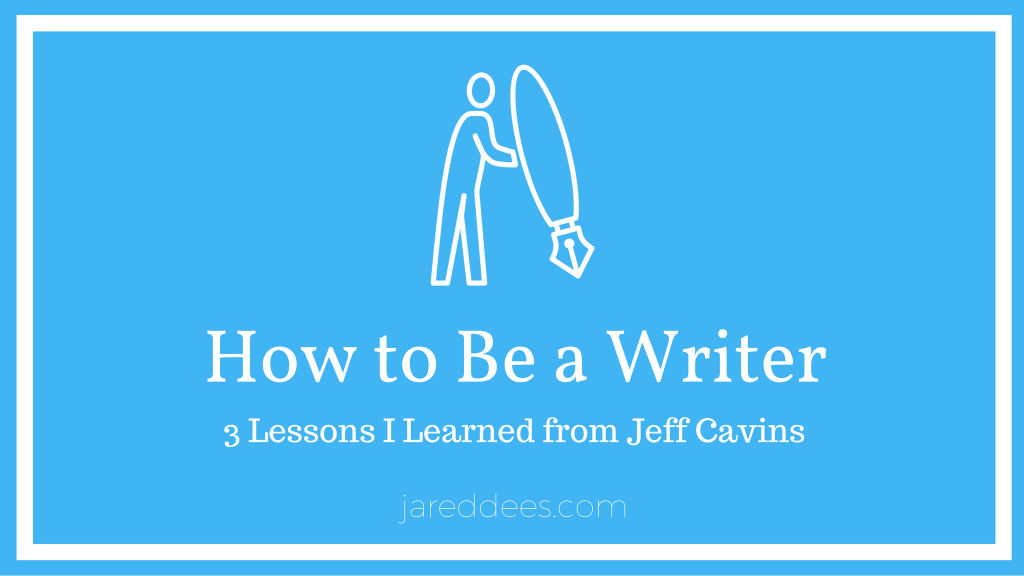
I always wanted to be a writer and speaker. It took me awhile to realize how to actually become one. Now the challenge is becoming a really good one.
Jeff Cavins is a writer and a speaker and he is good–really good. He is very well known among the people I write for and speak to, so when Jeff shares a podcast with tips on how to become a writer, I’m going to listen.
The podcast episode is for people who want to become writers and speakers, but I found his advice to be really good reminders of what to focus on even if you have written some books and give talks in front of groups.
Here are three lessons I learned from listening to this episode of his podcast:
One-Third, One-Third, One-Third
Divide your preparation time into thirds:
- Know your stuff.
- Know your audience.
- Know how to communicate with them.
These are the three areas to divide your time and focus in preparation. Spend a third of your time on each one. You might be an expert in your field, but you still need to focus on your audience. You might know your audience really well, but you still need to know your topic.
Listen to Jeff’s other podcast episodes and you know for sure that this guy knows his Bible. He is able to quote Scripture effortlessly. He knows his audience, too, sharing story after story of conversations with people he has had while out on the road giving speeches. I’ve never heard him speak, but I’ve seen him online and listened to the podcast. The guy knows how to communicate and I know our audience well enough to see why they like him so much.
Be a Specialist, Not a Generalist
I realized something recently that should have been obvious. I know Jeff Cavins as the Great Adventure Bible Study guy. It’s a program that is very popular among Catholic parishes. In my mind, he is THE Bible study guy. That is his specialty. But, I realized after listening to him on his podcast that he had a whole other career before this. I suddenly remembered watching Life on the Rock a TV show for young people on EWTN. Back then Jeff Cavins wasn’t just the Bible guy yet. He was known for something else. You can change your specialty, but you still have to have one. Being a generalist just doesn’t work.
People have short attention spans. They can only remember so much about you as a writer and speaker because there are hundreds of other people to try to keep track of. What’s your specialty? Being a generalist might be fun and interesting but it isn’t a great way to get known for something.
When you write a book, you become the authority on the topic. I just wrote a book titled Praying the Angelus. That is my specialty right now. Could I talk about other Catholic prayers? Sure! But the Angelus is what I’m known for because I dedicated the time to writing the book and getting the word out there about it.
Read: Knowing Your Personal Brand is Knowing your “The”
Be Careful Who You Share With in the Early Stages
When you are sharing an idea in the early stages, while it is raw and undeveloped in your mind, you open yourself up for early criticism. That criticism may shatter those early dreams. The ideas is new to you and sharing something that isn’t quite formed yet is naturally going to be misunderstood.
When I started a blog eight years ago for religion teachers, I didn’t really tell anyone. I didn’t have any readers. I wasn’t active on social media because I honestly didn’t know how to Tweet yet. But I practiced and got better. I enjoyed it so much that I got past worrying about criticism and after I’d done it for a few months it was impressive enough to see that I could do it and that it was worth the time.
I didn’t realize how much Cavins struggled to get people behind the idea of the Bible Timeline in his Great Adventure Bible Study program. From this vantage point it seems like an obvious bestselling program. The thing is, no one knows what will be a bestseller. I’ve learned that well over the years that I’ve worked at Ave Maria Press. All bestsellers are surprise bestsellers.
So be careful who you share your ideas with because they might not see the true potential–that same potential that you yourself haven’t quite come to believe in yet.
Call to Action
By teaching we learn. Did you learn anything by reading this? Share it on social media. You can teach with a 140-character tweet.


